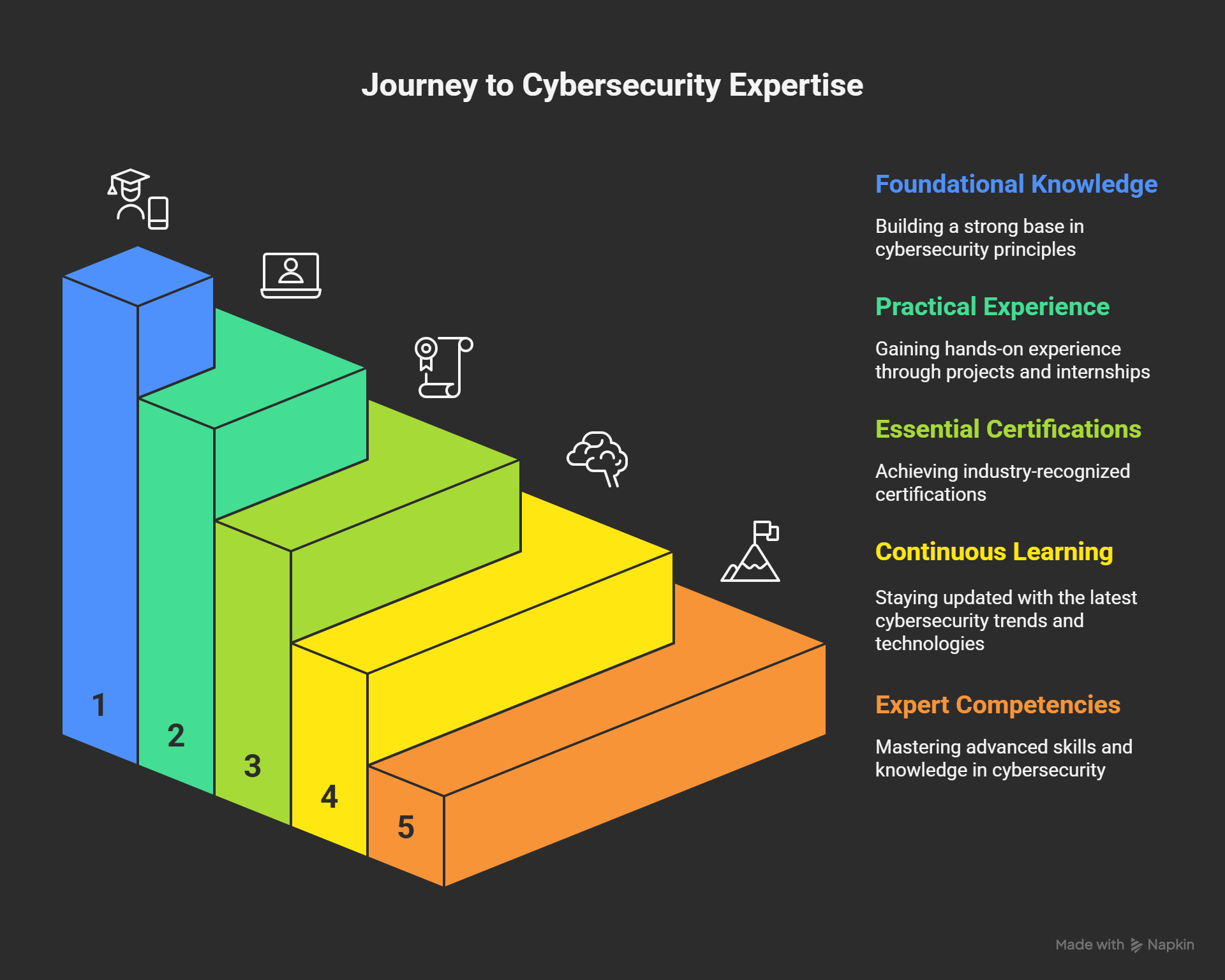Cybersecurity Certification Roadmap 2025: From Beginner to Expert
The digital landscape of 2025 is more connected than ever, and with increased connectivity comes increased risk. Cybersecurity has evolved into one of the most sought-after professions, with organizations worldwide investing heavily in protecting their data, networks, and systems. Certifications play a crucial role in validating skills, opening career opportunities, and helping professionals stay relevant in this fast-changing industry. This Cybersecurity Certification Roadmap 2025 provides a structured guide to help learners, IT professionals, and career switchers identify the best path to success.
Why Certifications Are Critical in 2025
The demand for cybersecurity professionals continues to outpace supply. Reports predict that by 2025, the global cybersecurity workforce shortage will surpass 3.5 million unfilled positions. Companies are actively seeking candidates who not only have hands-on skills but also certifications that validate their expertise. Whether you are new to the industry or already have experience, certifications help:
-
Build credibility and trust in your skills.
-
Align with industry standards and compliance requirements.
-
Open doors to higher-paying jobs and promotions.
-
Provide a clear learning path in a complex field.
Entry-Level Certifications (Beginner Stage)
If you are just starting your cybersecurity journey in 2025, entry-level certifications provide a strong foundation. They cover essential concepts like networking, security fundamentals, and risk management.
1. CompTIA Security+ (SY0-701)
-
Why it’s important: Recognized globally as the foundational certification for cybersecurity.
-
Focus: Threats, vulnerabilities, network security, identity, and access management.
-
Who should take it: Beginners entering cybersecurity roles, such as a security analyst or a SOC technician.
2. Microsoft Security, Compliance, and Identity Fundamentals (SC-900)
-
Why it’s important: With Microsoft’s dominance in enterprise environments, this cert is highly valuable.
-
Focus: Security, compliance, and identity fundamentals in Microsoft cloud services.
-
Who should take it: Professionals aiming for Microsoft cloud and security roles.
3. (Optional) Google Cybersecurity Certificate
-
Why it’s important: A newer but growing option, especially for cloud security beginners.
-
Focus: Foundational skills, hands-on labs, and career-ready training.
Time to Spend at This Stage: 3–6 months of preparation.
Intermediate-Level Certifications (Skilled Professional Stage)
After building a foundation, the next step is to validate your applied skills. Mid-level certifications focus on detecting threats, incident response, ethical hacking, and securing cloud environments.
1. CompTIA Cybersecurity Analyst (CySA+)
-
Why it’s important: Focuses on threat detection and response.
-
Focus: Behavioral analytics, incident response, security monitoring.
-
Who should take it: SOC analysts, incident responders, and blue team professionals.
2. Cisco Certified CyberOps Associate
-
Why it’s important: Cisco is a leader in networking and security solutions.
-
Focus: Security operations, monitoring, and basic incident response.
-
Who should take it: Those looking to work in SOC environments or Cisco-based networks.
3. AWS Certified Security – Specialty
-
Why it’s important: Cloud security skills are in extremely high demand.
-
Focus: Data protection, incident response, identity, and monitoring in AWS.
-
Who should take it: Security engineers working in cloud-first environments.
Time to Spend at This Stage: 6–12 months, depending on prior knowledge.
Advanced-Level Certifications (Expert Stage)
For professionals aiming for leadership roles or specialized expertise, advanced certifications are essential. These certifications position you as an expert capable of managing complex infrastructures and leading teams.
1. Certified Information Systems Security Professional (CISSP)
-
Why it’s important: It is known as the “gold standard” of cybersecurity certifications.
-
Focus: Eight domains, including security management, risk management, cryptography, and network security.
-
Who should take it: Senior-level professionals, managers, and consultants.
2. Certified Ethical Hacker (CEH)
-
Why it’s important: Ethical hacking continues to grow in importance as organizations invest in offensive security.
-
Focus: Penetration testing, attack vectors, malware threats, and hacking tools.
-
Who should take it: Security analysts, penetration testers, and red team professionals.
3. Certified Information Security Manager (CISM)
-
Why it’s important: Focused on management and governance rather than technical tasks.
-
Focus: Risk management, compliance, and governance.
-
Who should take it: IT managers, CISOs, and decision-makers in cybersecurity.
Time to Spend at This Stage: 1–2 years of preparation and experience.
Future Certification Trends in 2025
The cybersecurity certification landscape is evolving quickly. Here are some trends to watch:
-
AI & Machine Learning Security: Certifications focusing on AI-driven threat detection and automation are emerging.
-
Zero Trust Architecture: With the adoption of zero-trust models, certifications validating this expertise will grow.
-
Cloud-Native Security: Google Cloud, AWS, and Microsoft Azure are offering more security specialization tracks.
-
Vendor-Specific Certifications: Companies like Palo Alto Networks, Fortinet, and Splunk continue to expand certifications for niche areas.
Professionals should stay alert to these evolving options to stay ahead in their careers.
Career Pathway Example
To simplify the roadmap, here’s a practical pathway for someone starting in 2025:
-
Beginner (0–6 months): CompTIA Security+ → Microsoft SC-900.
-
Intermediate (6–18 months): CompTIA CySA+ → AWS Security Specialty.
-
Advanced (18–36 months): CISSP → CISM or CEH, depending on career goals.
This pathway ensures both foundational knowledge and specialized expertise.
Final Words
The Cybersecurity Certification Roadmap 2025 provides a clear direction for anyone pursuing a career in information security. From entry-level certifications that introduce the basics, to advanced credentials that establish global recognition, this roadmap ensures professionals are equipped to meet the challenges of tomorrow.
If you’re ready to secure your future, start by choosing the certification that aligns with your current level. Step by step, you can build the skills, credibility, and confidence to thrive in the rapidly growing field of cybersecurity.
More Updates:
https://taggedface.com/blogs/43926/Cybersecurity-Certification-Roadmap-2025-Step-by-Step-Guide-for-Your













